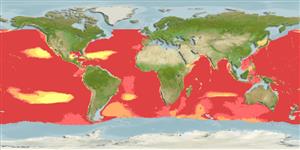Preferred temperature (Ref.
123201): 2.4 - 6.9, mean 4.1 °C (based on 1475 cells).
Phylogenetic diversity index (Ref.
82804): PD
50 = 0.5156 [Uniqueness, from 0.5 = low to 2.0 = high].
Bayesian length-weight: a=0.00603 (0.00331 - 0.01098), b=3.18 (3.01 - 3.35), in cm total length, based on LWR estimates for this species & (Sub)family-body (Ref.
93245).
Nível Trófico (Ref.
69278): 3.0 ±0.00 se; based on food items.
Resiliência (Ref.
120179): Elevada, tempo mínimo de duplicação da população menor que 15 meses (Preliminary K or Fecundity.).
Fishing Vulnerability (Ref.
59153): Low vulnerability (10 of 100).
Nutrients (Ref.
124155): Calcium = 95.4 [25.1, 258.5] mg/100g; Iron = 0.528 [0.190, 1.695] mg/100g; Protein = 16.3 [14.5, 18.1] %; Omega3 = 0.331 [0.109, 0.968] g/100g; Selenium = 14.8 [4.2, 47.5] μg/100g; VitaminA = 91.8 [10.8, 815.0] μg/100g; Zinc = 0.875 [0.437, 1.909] mg/100g (wet weight);
